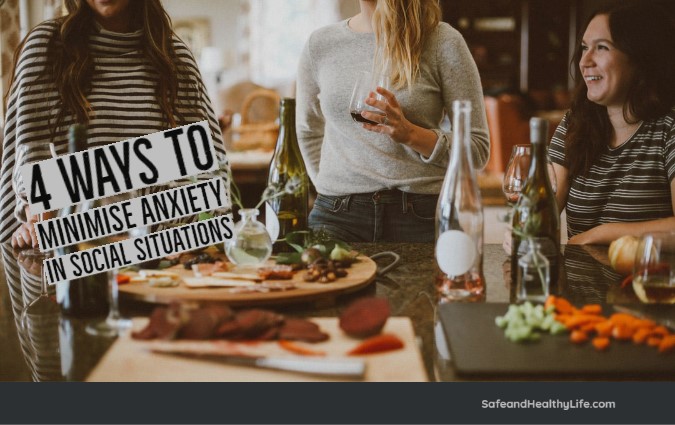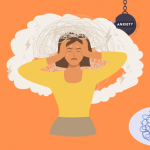
Social anxiety is extremely common, but we don’t always recognize it in those around us. It’s more than just being shy because social anxiety can cause noticeable physical effects too.
In very basic terms, social anxiety is a fear of certain social situations, and also usually accompanies a fear that you’re being judged. Even when we know these thoughts are irrational, it doesn’t always stop us from feeling anxious. The good news is, there are certainly many forms of anxiety treatment.
Here are a few helpful tips for dealing with anxiety in social situations.
1. Challenge your own negative thoughts
Perhaps the most important tool you have in combating social anxiety is actually yourself. People who suffer from social anxiety often leap straight into a negative thought.
It might be thinking you’re not good enough in a group, or your voice will start shaking when talking. Thoughts like this are often called ‘catastrophizing’ or ‘fortune-telling’. These types of negative thoughts can, in fact, be self-fulfilling.
Similar to cognitive behavioral therapy, by identifying these immediate negative thoughts, you can then begin to challenge them. Tell yourself that you can’t see the future, and you also don’t know how people will react.
If your first thought is ‘people will think I’m stupid’, try to analyze this. Give yourself valid, logical reasons that people would think that. By challenging these thoughts, you can slowly train yourself to think more positively in social situations.
2. Controlling your breathing
It may sound a bit too easy, but breathing actually plays a key role in managing your anxiety. Breathing quickly is one of the first physical reactions to anxiety, and also leads to further symptoms.
It may be dizziness, sweating or a feeling of suffocation. By controlling your breathing, you can slow the physical effects of anxiety.
If you feel yourself getting anxious, try this simple trick: Breath in through your nose for 4 seconds, hold your breath for 2 seconds, and exhale everything out for 6 seconds. Repeat this a few times, and you can slow your breathing enough to concentrate on other methods of anxiety control.
3. Try to focus on others
Because social anxiety has a lot to do with how you think you’re perceived, it’s natural to focus on your every movement. How you look, how you sound if you’re showing signs of anxiety.
Rather, it’s important to remember that most of the time, your anxiety isn’t visible to those around you. Try to focus on others, because this can take your attention away from yourself and your anxiety.
Practicing mindfulness techniques at home can also be a good stepping-stone. This will help you be more present at the moment, and focus on what is happening around you, rather than your internal thoughts.
4. Lifestyle choices to help with anxiety
You may have heard people talk about a healthy mind and healthy body going hand in hand.
Well, this concept is actually true. The way we eat, drink, live and essentially everything we consume can have a positive or negative effect on our minds.
Here are a few things to consider when trying to reduce your anxiety:
Physical activity: You don’t need to turn into a gym junkie, but regular exercise is important for your mental health as well as your body. If you can find 30 minutes each day to do some exercise, that’s a great start. Even if it’s just going for a walk around your neighborhood.
Caffeine: This can be difficult for coffee lovers, but caffeine is a stimulant. Therefore, it has the ability to increase anxiety symptoms. Coffee, soda, and energy drinks are the main culprit here. If you can’t cut them out completely, try to limit your intake.
Alcohol: While it’s a common theory that alcohol is a depressant and drinking it can make you relax, especially in social situations, it’s actually not completely true. Alcohol, depending on how much you drink can be another stimulant, and can have a negative effect on your anxiety.
Smoking: Perhaps one of the hardest changes to make to any lifestyle, quitting smoking plays a role in reducing anxiety. This is because nicotine is a stimulant, which can increase the chance of an anxiety attack.
Sleep: If you’re not getting enough sleep, or experiencing poor quality sleep, you are more susceptible to anxiety attacks. When you’re not well-rested, the anxiety over social situations can increase.
Finally, once you’ve mastered some of these anxiety control techniques, it’s important to use them. You don’t need to face your biggest fears straight away.
We’re certainly not suggesting you stand in front of a thousand people to give a speech.
But by gradually increasing the number of social situations you experience, the more you will learn to control your symptoms.
Anxiety is a very real problem for many people, but finding the right anxiety treatment can help you overcome your fears.
About The Author:
Stacey Smith is a freelance health writer. She is passionate to write about women’s health, dental health, diabetes, endocrinology and nutrition and provides in-depth features on the latest in health news for medical clinics and health magazines.

![[Infographic] Social Anxiety Challenges at School: Navigating the Path to Growth Social-Anxiety-Challenges-at-School](https://www.safeandhealthylife.com/wp-content/uploads/2023/10/Social-Anxiety-Challenges-at-School-1-150x150.webp)


